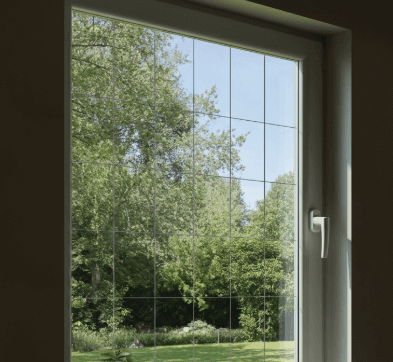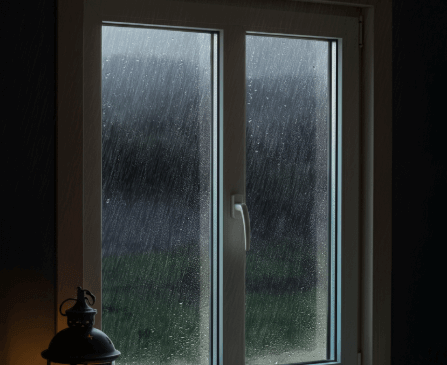When safeguarding your home from extreme weather conditions, an often overlooked critical component is the thickness of the glass in your impact windows. Understanding the role of glass thickness on impact windows can significantly influence these essential barriers’ safety, durability, and overall effectiveness. Read on as we delve into various aspects of glass thickness on impact windows, examining how different thicknesses offer varying levels of protection and impact resistance.
Steve Daria and Joleigh, seasoned real estate investors, have always emphasized the importance of utilizing high-quality impact windows for their properties. They recognize that selecting the right glass thickness not only significantly boosts safety but also enhances the longevity of the investment. They opt for thicker glass to protect their homes and properties against severe weather conditions and potential break-ins.
Understanding Impact Windows
Impact windows, known as hurricane windows, are specially designed to withstand extreme weather situations like hurricanes, strong winds, and flying debris.
Unlike regular windows, they are constructed with reinforced glass that resists shattering upon impact, thereby maintaining the integrity of the building envelope.

How They Differ from Regular Windows
Regular windows are susceptible to breakage under stress, posing hazards to occupants and allowing environmental elements to penetrate interiors.
In contrast, impact windows are engineered to mitigate these risks through advanced materials and construction techniques, making them essential for properties in high-risk areas.
Common Uses in Real Estate
Initially popular in coastal regions vulnerable to hurricanes, impact windows are increasingly adopted in urban settings for their security benefits, noise reduction qualities, and energy efficiency improvements.
Importance of Glass Thickness on Impact Windows
Explore the importance of glass thickness on impact windows to ensure safety and durability.
Safety Considerations
The safety considerations regarding glass thickness in impact windows are paramount for protecting occupants and property during severe weather events.
Thicker glass significantly enhances the windows’ ability to withstand high-force impacts such as those from hurricanes or strong winds.
This increased resilience not only reduces the likelihood of glass breakage but also minimizes the potential for debris penetration into the building, which could otherwise cause significant harm.
Performance Metrics
The glass thickness is a critical performance metric for impact windows, influencing insulation capabilities, noise reduction effectiveness, and overall durability.
Thicker glass provides superior insulation by minimizing heat transfer and sound intrusion, making it ideal for both residential and commercial applications.
Legal Standards and Regulations
Building codes mandate minimum glass thickness requirements for impact windows to ensure adequate protection during hurricanes and other emergencies.
Compliance with these standards is essential for property safety and regulatory adherence.
Get An Offer Today, Sell In A Matter Of Days
Benefits of Thicker Glass on Impact Windows
Here are the benefits for choosing a thicker glass on impact windows:
Enhanced Security
Enhanced security is a key benefit of opting for thicker glass in impact windows.
Thicker glass creates a formidable barrier that deters forced entry attempts, offering homeowners greater peace of mind and a heightened sense of security.
Compared to standard glass, which may be more vulnerable to break-ins, thicker glass provides a tougher challenge for potential intruders, increasing the time and effort required to breach the window.
Improved Energy Efficiency
Improved energy efficiency is a compelling reason to consider impact windows with thicker glass.
Thicker glass acts as a highly effective insulator, creating a barrier that minimizes the shifting of heat between the inside and outside of a building.
This thermal resistance helps maintain stable indoor temperatures year-round, decreasing reliance on heating and cooling systems.
By stopping heat from escaping during winter and blocking external heat from entering during summer, thicker glass ensures that indoor climates remain comfortable with less fluctuation.
Noise Reduction
Noise reduction is a significant benefit of choosing impact windows with thicker glass, particularly in bustling urban environments.
Thicker glass effectively acts as a sound barrier, decreasing the transmission of external noises such as traffic, construction, and other urban disturbances.
This acoustic insulation creates a quieter indoor environment, enhancing comfort and reducing stress levels for occupants.
How to Choose the Right Glass Thickness
Here are the things you need to consider when choosing the right glass thickness on impact windows:
Factors to Consider
When selecting glass thickness for impact windows, consider the following:
- Geographic Location: Areas prone to hurricanes require thicker glass for optimal protection.
- Building Type: Residential and commercial properties have varying priorities, such as energy efficiency, security, and noise reduction.
- Budget: Balance the initial cost of thicker glass with long-term benefits in safety and performance.
Recommended Thickness for Different Scenarios
- Hurricane-Prone Areas: A minimum of 7/16 inch thickness is often recommended.
- General Safety and Noise Reduction: 5/16 inch to 3/8 inch thickness is effective.
Consulting with Professionals
Seek advice from professionals to identify the most suitable glass thickness based on local regulations and specific property requirements.

Installation Tips for Impact Windows
Explore these tips for installing impact windows and ensuring safety.
- Pre-Installation Preparations: Ensure window frames are structurally sound and properly prepared to support impact windows. Accurate measurements are crucial to avoid installation issues.
- Proper Installation Techniques: Follow manufacturer guidelines meticulously to ensure impact windows are installed securely and effectively. Proper installation maximizes their performance and longevity.
- Post-Installation Checks: Inspect installed windows for any gaps or misalignments that could compromise their functionality. Addressing issues promptly ensures optimal performance during adverse conditions.
Frequently Asked Questions
Explore the most common queries about glass thickness on impact windows.
What is the ideal glass thickness for impact windows?
Generally, 7/16 inches is recommended for hurricane-prone areas.
How much does thicker glass cost?
Thicker glass options are typically more expensive due to their enhanced properties, but they offer significant long-term benefits.
Can I install impact windows myself?
DIY installation is possible, but professional installation ensures compliance with safety standards and optimal performance.
Conclusion
The thickness of glass in impact windows significantly influences safety, performance, and comfort in residential and commercial properties. Whether you are purchasing, selling, or investing in real estate, understanding the importance of glass thickness empowers informed decision-making.
By selecting the appropriate glass thickness, property owners can fortify security, improve energy efficiency, and create quieter living or working environments. Consultation with professionals ensures compliance with regulatory standards and tailored solutions to meet specific needs.
**NOTICE: Please note that the content presented in this post is intended solely for informational and educational purposes. It should not be construed as legal or financial advice or relied upon as a replacement for consultation with a qualified attorney or CPA. For specific guidance on legal or financial matters, readers are encouraged to seek professional assistance from an attorney, CPA, or other appropriate professional regarding the subject matter.

